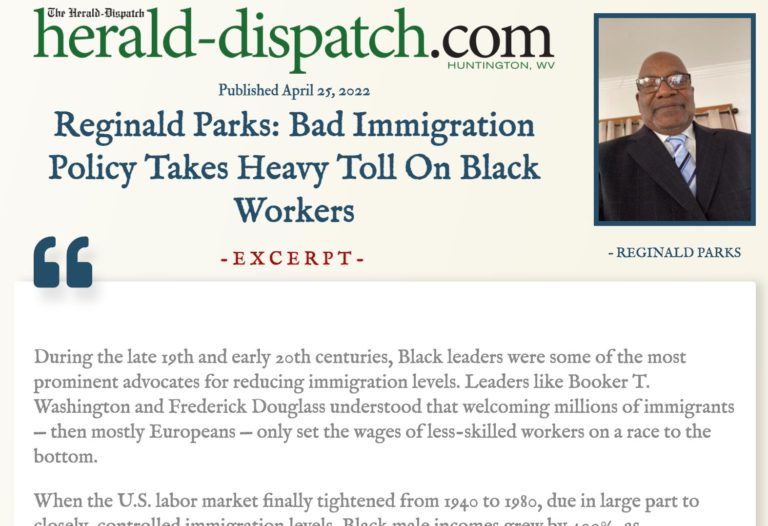“For eight days in July 1834, immigrants’ fear of the mere possibility of a future flood of newly freed slaves from the South competing with them for jobs in New York City boiled over into a full-scale riot involving thousands. It drew international attention.” – Back of the Hiring Line, Chapter 3
Watch the video here:

The 200-year history documented by Roy Beck in his book puts our current moment into context.
Reginald Parks says the employment gap today is partly due to employer bias, and “partly the result of disastrous immigration policies that have depressed workers’ — especially Black workers’ — wages.” Yet, “even now,” he writes, “members of both parties are pushing to increase the overall level of immigration.”

Citing Back of the Hiring Line, Parks says the “historical record shows exactly what will happen if [expansionists] succeed. Reducing the influx of foreign workers, and thus ensuring tight labor markets, is the best way to improve the lives of workers of all races, but especially Black Americans.”
T. Willard Fair puts it more harshly: “Congress continues to relentlessly push immigration policies that’ll make Black Americans poorer.”
Karen Shragg likens a good immigration policy to good parenting, where one must establish clear, reasonable rules, and enforce them without favoritism:
A good parent, for instance, wouldn’t allow their strongest child to exploit his younger, weaker siblings or neighbors. Yet that’s exactly what corporate executives have done to vulnerable workers. For decades, Big Business has lobbied its allies in Congress to ensure an ample supply of cheap foreign labor to suppress wages.
“African Americans, in particular, have suffered, as Roy Beck’s 2021 book, “Back of the Hiring Line, A 200-Year History of Immigration Surges, Employer Bias, and Depression of Black Wealth” documents….
“….Immigrants have suffered too — more than a third of workers here illegally have experienced minimum wage violations. Unscrupulous employers can cheat these workers out of pay and force them to endure deplorable conditions, knowing that the laborers are unlikely to report the abuse.”
Adrian Norman describes how mass immigration is a form of theft:

That competition between illegal immigrants and Black men keeps wages down. Entry-level jobs that are typically filled by low-skilled workers are supposed to be stepping stones that allow those workers to gain experience, develop their abilities and a solid work ethic, and prepare them for their next job, often one that comes with higher compensation and benefits.
“And systematically reducing the number of Black males in those entry-level jobs by artificially increasing competition is counterproductive to income and wealth creation for Black Americans…which robs them of future earnings and savings potential.”
Pamela Denise Long says it’s easy to understand why some Black Americans are moving away from Democrats, but says the GOP needs to consider the unique place multi-generational Black Americans have in the country if they truly want to make inroads.

“Our community is deeply committed to the national character of America, however flawed it has been and remains,” Long writes.
“We want a tight job market, so all American workers benefit from the corporate ingenuity of the U.S. companies we patronize. We want safe communities. And we want the right to define our own nation….”
Glen Loury and Alexander Riley’s conversation about nationalism, family formation, and labor spurred Loury to reflect on how those oft-intertwined aspects of American life and culture have changed since the 1960s, in part due to the 1965 Immigration and Nationality Act that kicked off the still-ongoing greatest wave of immigration in American history. Mass immigration gives the business elites the expanded labor pool they constantly crave, and change the social networks critical to recruitment.
To Loury, the racial disparities that result are only part of the “larger social abandonment of a set of norms which manifests itself most immediately and most severely in the African American population, but which really is a larger atmospheric that’s developing for all of us.”
Roy, Josh, Ali, and Nyhiem also look at immigration policy’s impact on family formation, education, and incarceration.

A Nation with an economy, not the other way around
The globalist story of the 80’s and 90’s has turned out to be wrong in every way, according to Oren Cass in a conversation on the Ricochet podcast. Erasing borders didn’t bring about peace and didn’t make everyone better off.
“This theory that whatever leads to the multinational corporation earning the most profit is ultimately going to be good for your typical American worker, it’s just not true,” he says.
Cast down your buckets…
There are roughly 50 million working-age Americans out of the labor force. If the labor participation rate was where it was just 20 years ago, 7 million more Americans would be working.
“If heads of households are unemployed for long periods,” writes Joe Guzzardi, “intergenerational poverty can become a long-term consequence. A child’s economic future is most often determined by his living circumstances until he reaches age 23.”
The business lobby will always claim they need more workers. But every time Congress has tightened immigration, Americans who had previously been written off by employers proved themselves capable of meeting the labor needs of the nation. Every time. And when they prospered, America bent toward economic justice for all Americans.
See more videos from and about Back of the Hiring Line here.

JEREMY BECK is a V.P., Deputy Director for NumbersUSA
Take Action
Your voice counts! Let your Member of Congress know where you stand on immigration issues through the Action Board. Not a NumbersUSA member? Sign up here to get started.
Donate Today!
NumbersUSA is a non-profit, non-partisan organization that relies on your donations to works toward sensible immigration policies. NumbersUSA Education & Research Foundation is recognized by America's Best Charities as one of the top 3% of well-run charities.
Immigration Grade Cards
NumbersUSA provides the only comprehensive immigration grade cards. See how your member of Congress’ rates and find grades going back to the 104th Congress (1995-97).